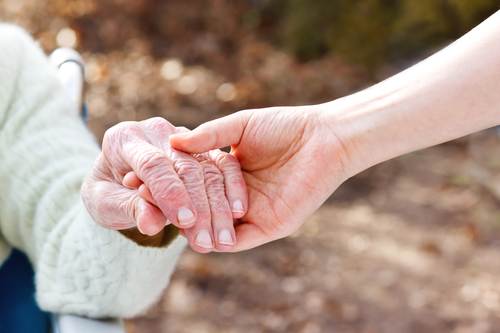
There are many people who are currently caregivers for their parents. The National Alliance for Caregiving reports “over 65.7 million Americans currently provide care for a family member or loved. Thirty Six percent of them are caring for an elderly parent.”
It is a challenging transition when the person who took care of you is now the person that needs help from you. I was thinking about this ultimate role reversal because Mother’s Day will be here soon. I lost my mother 32 years ago. She died after battling cancer for several years. My father was her primary caretaker and I helped. She was very clear that she wanted to remain at home. She also was reluctant to have outside help in spite of her increased need for ongoing care with all of her mobility and self care needs. The most difficult part was the cancer had metastasized to her brain causing a real change in her personality and actions. She became increasingly verbally abusive and agitated. My dad found that part of her illness the hardest to cope with. He could not separate her disease which caused these actions from the person she was. He mistakenly assumed she could control these actions.
I am older and wiser now. My work as a patient advocate and medical social worker has offered me many lessons that I wish I would have known at that time. Here are some important tips that I hope you find useful in your role as a caregiver for your parent:
- Remember in the midst of caregiving you are grieving the person you once knew. Just as my father saw, we have to remember that our new role as caregiver means the person we knew is changing and gone. They may be declining physically, medically, mentally, and emotionally. You have to grieve that loss as you take on this new role. You may need support and the passage of time to get through this grief process so you can be a more effective caregiver.
- You Bring Your Previous Role into Your New Role as Caregiver-Unfortunately our families have a way of labeling us that stays with us through adulthood. Who was the problem child, the sensitive one, the peacemaker in your family? Are there unresolved issues from growing up that may inhabit your role as caregiver? How will this complicate your role as a caregiver? Will your previous relationship help or hurt your caregiver efforts? If the answer is the latter you may want to consider getting somebody else to be the primary caregiver. These previous relationship problems will certainly arise with ongoing contact and it may be in ways that neither you or the person you are caring for would choose. It could result in more confrontations and less collaboration in your caregiver relationship. You can still help in other ways, perhaps financially, advocacy, or with medical bills/insurance, or by coordinating additional help.
- Try to Preserve Dignity-It can be emotionally hard to be the person that is feeding, dressing, bathing, or helping your parents in the bathroom. You want to respect their privacy as much as you possibly can. Remember the role reversal is difficult for them as well. Their loss of independence is a reminder of their loss of function for all concerned. If is it possible to get someone who is not a family member to help with bathing (for example) you might want to consider that.
- Remember to Reminisce- One special component of caring for a parent is you share a past relationship and memories. You may remember their favorite book or song even if they don’t. Telling old family stories, sharing family pictures, or favorite movies may help rekindle their memory. The beauty of this is it may also create meaningful moments for you as a caregiver too. Try to include things you know your parents enjoyed in your current role as a caregiver. For example, if your mom loved flowers take a walk in a garden, bring flowers to the house or look at pretty pictures of flowers in a magazine or on T.V.I know for many people Mother’s Day and Father’s Day can be a difficult time if your parent have died or are struggling with an illness. Our expectations of ourselves can be greater in regard to helping our parents because they are who they are. This is true if you have a great relationship or you are caring for them out of a sense of obligation. Be sure to remember to take care of yourself each step along the way. If your parent has died try to cherish the good memories and moments that you shared with them.
LEARN TO LOVE YOUR LIFE AGAIN
 Do you feel like you need to hit the REFRESH button on your life? Download our free guide and begin to create your best life yet!
Do you feel like you need to hit the REFRESH button on your life? Download our free guide and begin to create your best life yet!


